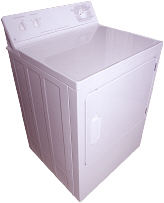Description
IRS Tax Audit Manual for the Laundromat Industry
“You Can Survive An Internal Revenue Service Tax Audit Without Being Taken To The Cleaners!”

IRS Tax Audit Manual created specifically for the Laundromat Industry was written with the assumption that there is a reasonable indication of unreported income. Hmmm, that’s interesting…Why would the Internal Revenue Service write a training manual for their auditors based upon the assumption that you have unreported income?
Perhaps it is based on your answers to the following questions:
- Do you have first-hand knowledge of laundromat operations?
- Do you repair your machines yourself?
- Do your machines have automatic water level adjustors?
- Do your returns include an attendant?
- Do you offer wash & fold service?
- Do you offer pay telephones, soap, video games, soda and snack machines?
- Do you document each flooding incident resulting from a malfunctioning machine?
If you don’t understand how the answers to these questions can affect your outcome in an audit situation, you need to educate yourself NOW!
The IRS is prepared to issue summons for the following: Water records, bank statements, taxpayer records and taxpayer responses as well as contact with third-party providers.
Often, IRS Agents are sent out to visit your facility without your knowledge. The agents will spend several hours in your laundromat observing customer behavior and documenting the patterns of customer use of each washing machine. They will document the number of quarters your customers feed into the dryers to dry different washer loads. The examiners will also monitor whether you have any customers that wash their clothes without drying them at your facility.
In less time than it takes to wash and dry just one load, you can read the entire manual that the Internal Revenue Service Agent will use when auditing your laundromat.
The Internal Revenue Service has determined that a laundromat is generally a cash business with little audit trail. Not to worry, they will help you to create an audit trail by looking at all of your books – not just for your business, but for your personal life as well. Do you often pay cash for recurring monthly obligations? Learn now why that’s not a good idea.
What will the IRS do if you do not cooperate with the agent?
Instructions to the agent: “Taxpayer cooperation is preferable but not essential. If the taxpayer chooses not to cooperate, do your best to reconstruct income without taxpayer’s input. Use current wash/dry prices. Use customer percentages according to the equipment inside the Laundromat today. For example, if there are five top loaders and five 30 pound side loaders, allocate customer use at 50% of the top loaders and 50% to the 30 pound side loaders.”
Get your very own copy of this invaluable IRS Tax Audit Manual for the Laundromat Industry NOW!
TABLE OF CONTENTS
- Forward
- Introduction 1
- Pre-audit 1
- Initial Interview 1
- Cash Flow and Books of a Laundromat 2
- Water Consumption Analysis 3
- Data Needed for a Consumption Analysis 3
- Determining Standards 3
- Calculation of Water Waste and
- Taxpayer Statements
- Which Could Affect the
- Consumption Analysis 5
- Customer Use Percentages and
- Visiting the Laundromat 6
- Customer Use Percentages 6
- Visiting the Laundromat 6
- Taxpayer Arguments Concerning
- Dryer Income 7
- What To Do If The Taxpayer
- Will Not Cooperate 8
- Case Development and
- Case Closing Checklist 8
- Prior Litigation 9



